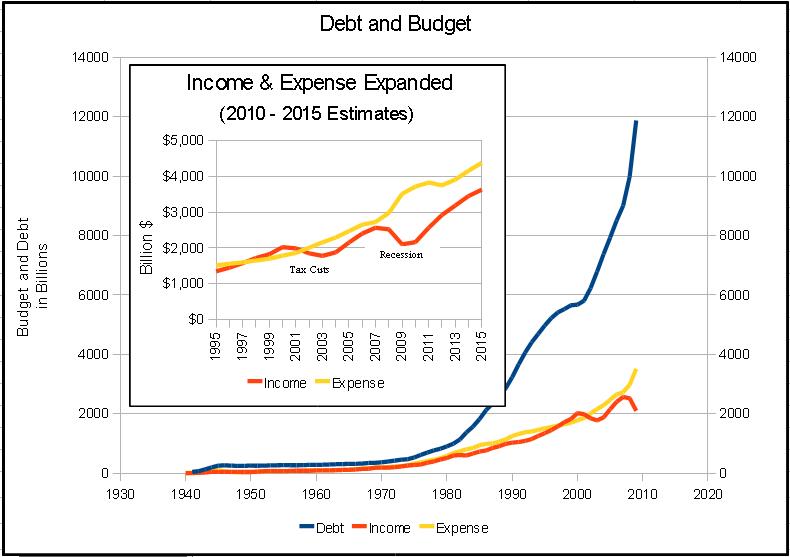63% of American believe that the government spends more on defense and foreign aid than it does on Social Security and Medicare. Not true, and not even close if defense ($895B) is compared to mandatory ($2,166B) spending. The current argument in Washington is over cutting less than $100B from discretionary spending. The budget deficit is 12.7 times that amount, and the national debt is 130 times the maximum debated budget cut.
Budget Deficit and Public Debt is all the rage today in the media and political rhetoric. What is the data behind all the talk? Starting with this post I will share information, traceable to the Congressional Budget Office or The US Treasury, and my interpretation of the situation. The political and economic placing of blame and support of solutions will be assigned to the reader.
— *** —
The financial function of government is to take wealth from the public and redistribute to the public directly or through entities foreign and domestic. The question always before the public is, how much wealth to take and how to redistribute it.
The answer is driven by demand for services (defense, health, education, and welfare) and belief that those who can best afford to pay should (corporate tax, progressive income tax, excise, estate, and gift taxes).
The difficulty is that a service for Paul is a bill for Peter, and government is left to interpret the needs of Paul and willingness of Peter to pay.
The outcome has been to satisfy Paul through increased spending, and to placate Peter with reduced taxes, resulting in Federal deficit and debt.
The problem is that the debt is increasing at an extraordinary rate that will eventually bankrupt the government if Paul and Peter don’t both make sacrifices to reduce it. Debt is the blue line approaching twelve trillion dollars in the chart below, while Deficit is the difference between Income and Expense.
 Data Source: http://www.usgovernmentspending.com/
Data Source: http://www.usgovernmentspending.com/
Debt has dramatically increased since 1975 to $12,311,349,677,512 in 2009, while Budget deficit has only been positive in 1998 through 2001. Each year’s budget deficit adds to the debt, just like at your house, but the debt growth exceeds the deficit. This is because of off budget spending (Supplemental Appropriations, $191 billion in 2009) and other spending that I can’t identify.
Paul (spending) and Peter (income) will both have to sacrifice in order to reduce debt to a manageable level because there is not enough flexibility on either side of the budget. See the 2011 proposed budget below.
 Chart Source: http://www.washingtonpost.com/wp-srv/special/politics/budget-2010/
Chart Source: http://www.washingtonpost.com/wp-srv/special/politics/budget-2010/
The currently proposed 2011 budget will pay $251 billion interest on the debt, while adding $1.27 trillion to the principle. Balancing the budget would require 33% reduction in spending or a 49% increase in income, and that is before any debt reduction can occur. Neither Paul or Peter alone can survive that degree of sacrifice.
If the Budget is to be balanced, Income must increase and Spending must decrease. We can’t continue with the proposal of faux presidential candidate Hugh Jidette, “Keep on spending and let our kids pick up the tab.” On the income side, personal and corporate income tax is the only area where a significant increase can occur. Balancing the budget by cutting expenses would wipe out all discretionary spending, and this is why mandatory spending cannot remain untouched in the future. I will cover both Income and Expenses in future posts.
In the next post I will look at the debt; who owns it — it’s not all China, and what is a reasonable amount of debt — it’s greater than zero.
[print_link]

Leave a Reply